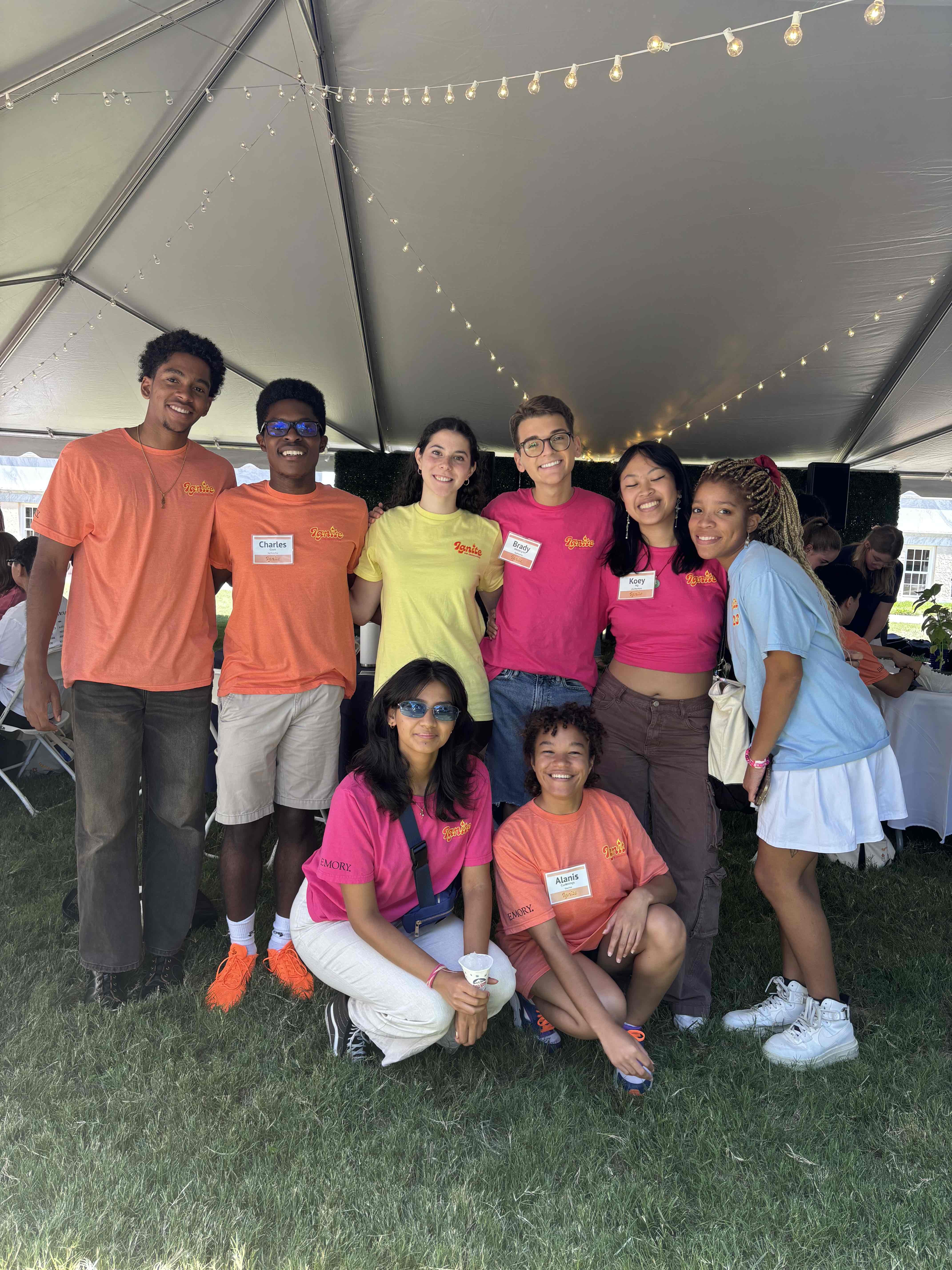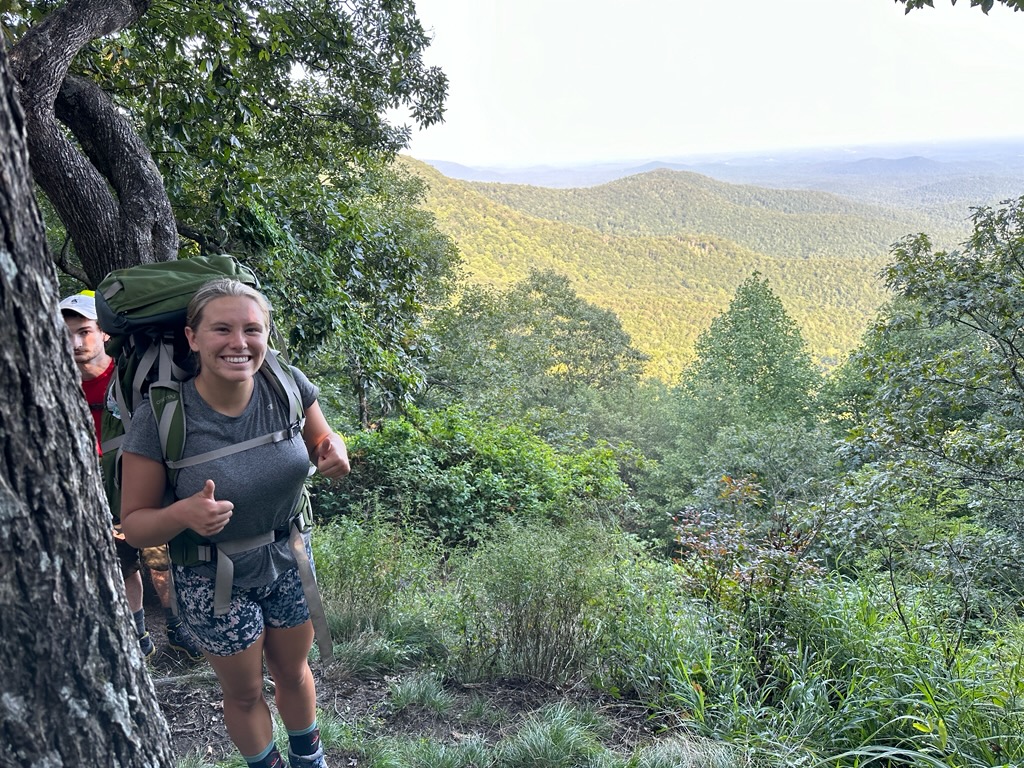“I had heard all the advice of getting out of your comfort zone and experiencing new things in college,” says rising sophomore Heather Smyth. So when the opportunity presented itself before the start of her first year, she signed up for the Summer Outdoor Adventure Retreat. Better known as SOAR, it’s a pre-orientation program that immerses students in the great outdoors.
Smyth, who hadn’t camped since she was a child, was suddenly spending four days on the Appalachian Trail, purposely leaving her phone in her dorm room for the entire experience.
Turns out, she loved it. Now going into her second year and majoring in neuroscience and behavioral biology, she’s highly involved with Outdoor Emory and is returning to the Appalachian Trail — now in charge of incoming students as a SOAR pre-orientation leader — in mid-August.
Many options for many interests
Pre-orientation programs at Emory started as a way to allow students to build community before classes start. Now, more than half of the incoming class is participating in the pre-orientation programs and International Student Welcome — and folks across campus are seeing it pay off in dividends.
Pre-orientation participants move in one week earlier than the rest of their cohort. This year, expect to see the newest Eagles arriving on Monday, Aug. 18.
Interested first-year students can choose from three different programs: Ignite, SOAR, and Welcoming Interfaith and Spiritual Exploration (WISE).
Ignite uses large- and small-group activities to help students from both the Atlanta and Oxford campuses set goals for the upcoming year, explore the city, engage with faculty and staff, and grow their sense of belonging. Ignite has partnered with organizations across campus to offer seven tracks that are open to anyone: Community Engagement, Creativity, Innovation, Belonging, Leadership, Sustainability and Well-Being. There are also two invitation-only tracks: Athletics and FirstStem.
The SOAR pre-orientation program also has three types of trips to be accessible to as many students as possible. While all three tracks focus on the outdoors and adventures such as ziplining, hiking, tubing and more, they differ in remoteness. Multisport day trips allow students to return to their residence hall at night; camping trip participants spend the nights off-campus with less access to modern-day conveniences; backpacking overnight requires students to carry a 20-40 lb. pack, and spend the night in tents without access to running water, bathrooms or cell phone coverage.
The WISE program is designed to ease students’ transition to college while providing an opportunity to explore Atlanta, build skills in religious and philosophical literacy and interfaith leadership, and make new friends. The program explores six to eight spiritual and religious communities on and around campus, in historic Atlanta and beyond.
“Pre-orientation programs give our incoming students a chance to settle in and get to know Emory before the full rush of the fall semester. It’s a quieter time on campus, so they can explore interests, meet peers and upper-level student leaders, connect with faculty and staff, and really start feeling at home before everything gets busy,” says Carson Banks, director of student engagement within the Student Involvement, Leadership, and Transitions office. “We focus on how to make connections with other people and with the institution.”
While some students choose a program that connects to their passions and interests from high school, plenty choose something else entirely, allowing students to forge connections with peers they may otherwise never have met. “We typically hear, anecdotally, that the connections students make during pre-o stick with them,” says Banks.
Banks also points to the growth of programs, explaining that it’s been a priority to expand access and offer as many unique, interest-based tracks as possible.
Students who participated themselves often come back for more as a leader — some of them for their entire time as an Eagle.
Returning students reflect on their own pre-orientation experiences
Incoming students who participate in pre-orientation get dedicated time to start this new chapter of adulthood without the added stress of immediately juggling classes.
Rising junior Morgan Lee, who is majoring in philosophy, politics, and law, says he participated in the WISE program because he wanted to get to campus as soon as possible.
“I grew up in Johnson City, Tennessee, in the mountains. I’d never lived in a big city,” says Lee, who is now a WISE pre-orientation leader. “What better way to start off the first four years of my independent life than by talking to people who have backgrounds that I know nothing about.”
And by stretching their horizons, students also forge connections with their peers.
“The thing I reflected on most after SOAR was that part of the reason those first few weeks are so hard is because you don’t have any shared experiences with the people around you,” says Smyth. “SOAR gave me a group of people who had shared experiences and memories, which gave a foundation to make those meaningful relationships.”
As an added bonus, campus is emptier, too. Without returning students around and classes in session, campus moves at a slower pace — which means more confidence finding their way around when classes do start.

Charles Cook (standing, second from the left) and his cohort of Ignite Leadership pre-orientation leaders in 2024.
“During my pre-orientation, I got lost a lot,” laughs Charles Cook, a rising junior majoring in applied math and statistics, who participated in the Ignite Leadership track as an incoming student and is now a pre-orientation leader for Ignite Well-being.
“But I used White Hall as an anchor to know where I was and I got familiar with how Emory is structured across campus, how to get to Emory Point and I got a feel for the city of Atlanta, too,” he says.
Rising senior Angelina Dalloul started her Emory journey at Oxford College — which she’d never visited before pre-orientation.
“It was nice to be able to adjust with so few people on campus and to ease my general anxiety about going to college,” she says. “I had a wonderful time and made connections I’ll always appreciate, which sparked me wanting to give back to the program.”
Since then, Dalloul has worked as an Ignite pre-orientation leader and is serving as a pre-orientation coordinator this year. As she prepared to transition to the Atlanta campus, she guided students on the Community Engagement Track. One activity she helped lead included volunteering at the Atlanta Community Food Bank.
“One of the best things that pre-orientation has taught me is that you can be an agent of change within your community,” Dalloul says. “You’re not just a student at Emory. You’re also a citizen of Atlanta — this city becomes your community.”
Growing as leaders
Pre-orientation is a way for incoming first-years to stretch beyond their comfort zones. But student leaders attest that it does the same for them, whether it’s their first year or third year leading others.
To become a pre-orientation leader, students must attend trainings during the spring semester and continue training in the summer to ensure they’re equipped with all the necessary tools. (For SOAR, that includes getting certified in wilderness first aid.)
“It’s amazing how being a leader changes you in ways you can’t anticipate and drives your growth,” says Dalloul. “It’s about making the most of every situation, even when circumstances are unexpected. It’s taught me adaptability and flexibility.”
Leaders also return with the knowledge that virtually everyone is nervous about starting college and making friends. And they’re still close enough to having been a new student themselves that they remember those feelings well.

Heather Smyth on the Appalachian Trail during her pre-orientation program in 2024.
As a pre-orientation leader, Cook likes to leverage the small group atmosphere to help students open up. He remembers being quiet when starting at Emory and reminds students that most folks are that way at first.
“If you go up and talk to someone, 99% of the time you’re going to make a new friend. Everyone wants to make friends and get adjusted, and being in a small group helps gain common ground, giving a space designated to building relationships and friendships, and that’s very impactful,” Cook says.
Smyth and Lee both credit much of their college experience to their pre-orientation programs, exuding love for SOAR and WISE, respectively.
“The thing I’m most known for in college is something I’d never done before I got to college,” laughs Smyth. “I realized how much I love being outdoors. It was all a new experience that I didn’t necessarily expect to like. But it’s now my favorite thing I do on campus and I want to keep doing it for the rest of my life.”
Lee holds a work-study job at the Interfaith Center and is president of Beloved Community Worship. Through WISE, he discovered a passion for exploring other cultures — one that took him to a remote town in Morocco last semester for study abroad.
“I would’ve never done that trip if it wasn’t for WISE. I’d never been north of Cincinnati. I always knew I was curious and wanted to learn more about people, but I never realized I could actually do it until WISE,” he says. “It’s unbelievably amazing and I would’ve never guessed the rabbit hole I would’ve gone down after doing this program.”
“There’s something so special about pre-orientation week,” says Lee. “I would do WISE every week of the year if I could.”
Interviews conducted by Anna Chapman and Michelle Ricker.

